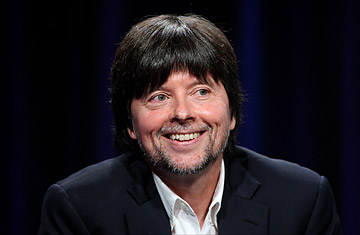
Filmmaker Ken Burns
Documentarian Ken Burns has comprehensively chronicled the Civil War, baseball, jazz, World War II and the national parks. Now he's returning to the old ball game. As an epilogue to his landmark nine-part, 18½-hour PBS documentary Baseball, which aired in 1994, Burns and longtime collaborator Lynn Novick have examined the last 16 years of the national pastime in Baseball: The Tenth Inning, a two-part, four-hour film that airs Sept. 28 and 29 at 8 p.m. E.T. on PBS. Burns and Novick talked to TIME about their favorite baseball stories of late, the amazing Ichiro Suzuki and what the sport's next chapter might look like.
TIME: So, why did you make The Tenth Inning?
Novick: We never thought we'd do anything more about baseball. It was always "On to the next subject." But baseball kept on going. And some really interesting things were happening, starting with the 1994 strike, steroids, records being broken by these larger-than-life figures, more Latin players coming into the game, the Yankees resurfacing and the Red Sox finally breaking the curses.
Burns: Baseball is the best game that's ever been invented, and it mirrors who we are. We have just gone through two of the most consequential decades of our history, and baseball has too. It begged for a sequel.
TIME: Unlike some of your past projects, in this film you chronicle a time that is still fresh in the minds of many fans. Since these viewers will know the material, might they find the lack of new, surprising revelations or discoveries disappointing?
Novick: We're not in the business of breaking news. We have never tried to do that. Hopefully, what we're doing is not providing new facts but new perspectives.
Burns: We want people to think, We've heard these notes before, but not in this arrangement.
TIME: The film deals with controversial figures like Barry Bonds and Mark McGwire, yet we don't hear from many of them in the interviews. Do you feel that negatively affects the film?
Burns: You know, it's not O.K. and it's O.K. I would have liked to have an interview with Abe Lincoln. I really think it was a loss for the Civil War film. But what would Barry Bonds have given you, except for what his lawyers told him to say? Or the kind of clichés that Nuke LaLoosh [the naive pitcher played by Tim Robbins in Bull Durham] said: "I would like to thank God for all the talents I have. I want to play within myself." What the hell does playing within oneself mean?
TIME: What is the most important baseball story of recent times?
Novick: You'd have to say the steroid story, because that cast a pall over everything. The other parallel story is labor peace. The strike was this horrible calamity, but since then, owners and players have figured out a way to get along. That's brought incredible prosperity and success to the game.
Burns: The fan in me says the Red Sox comeback, just for pure, dramatic, great baseball. And I'm a Red Sox fan. But I'd have to agree with Lynn that it's the steroids and the strike combined. Those events also have positive connotations. Baseball has moved from its ostrich-like existence into being the most aggressive professional sport when it comes to steroid testing. We're out of the steroid era.
TIME: What's your favorite story of the last 16 years? Ken, we can guess what yours is.
Burns: You have to understand, this is not only coming from a person who has been a Red Sox fan for 38 years or so but from someone who had to edit all the heartbreaking Red Sox losses in the last film. Plus, there hasn't been a championship in sports that meant more to a region than the 2004 World Series meant to New England. It has meaning that extended my fandom.
Novick: My favorite is the story we tell about Ichiro Suzuki. It's a revelation to hear him speak about the game in a different way than anybody else. To come to a foreign country and not speak the language, and to go against the grain of where the game is supposed to be headed and be really centered about it, I found that really fascinating.
TIME: If you were named baseball commissioner, what would you change about the game?
Novick: I wish they had shorter games. I know people say that all the time, but I get tired watching. Revenue sharing will work only when owners invest in the team, not put money in their pockets. That's hard to police. I think they have to do something about the exploitation of Latin players. They need a draft or something. If you're going to benefit from all these great players, you have to do something for the kids who don't make it.
TIME: Do you plan on continuing the baseball narrative after this film?
Burns: When we do the The Eleventh Inning, in 10 or 15 years, it will be interesting. You would start out with Armando Galarraga and the perfect game that wasn't, because that was just one of the greatest moments in the history of baseball. You would punctuate it with incredibly poignant conversations with the Mark McGwires, maybe the Sammy Sosas, maybe even a Barry Bonds or a Roger Clemens. Down the road, you'd hope these guys begin to have a degree of self-awareness about their circumstances. If only one or two of them provided you these little telegrams, it would be incredibly interesting. Because we're going to be negotiating how we tell these stories forever.
